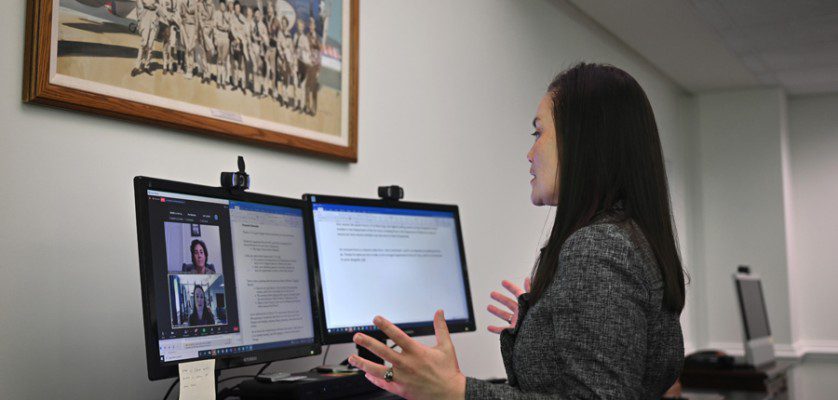The Women’s Initiative Team and the Secretary of the Air Force Office of Diversity and Inclusion hosted the second annual Department of the Air Force Women’s Air and Space Power Symposium March 8-10, 2022.
Hundreds attended the virtual three-day symposium to hear a variety of panelists highlight the importance of equality for women in the military and discuss how leaders, regardless of gender, can break barriers to pursue positive change at any level in the Air and Space Forces.
“Our Department demands diverse leadership styles to help address the complex problems facing our Airmen and Guardians today,” said Secretary of the Air Force Frank Kendall. “Representation matters. Having female leaders at the table matters. As your Secretary of the Air Force, I acknowledge we have more work to do.”
Kendall opened the symposium with a message to participants that encouraged them to consider why women’s equality is not just a conversation for women, but for leaders, to ensure the force is as diverse and reflective of the society it serves.
“As we look ahead to the next 75 years of the Department of the Air Force, we must ensure that we have the brightest young Americans we can get,” Kendall explained. “To do that, we must ensure that all who serve, and all who want to serve, in the world’s best Air Force and world’s only Space Force have the opportunity to do so. We must create an environment where all who serve feel like they are needed, their service is equal to those around them, and their families are taken care of.”
Panelists from around the Air and Space Forces joined the conversation that spanned beyond gender equality — encompassing topics that included balancing family and service, practicing resilience and becoming a leader.
Keynote speakers Chief Master Sgt. of the Air Force JoAnne S. Bass and Chief Master Sgt. of the Space Force Roger A. Towberman honed specifically in on the importance of being a multifaceted leader for the sake of Airmen and Guardians that fall under the care of a noncommissioned officer.
“Understand how critical you are,” Towberman emphasized to listeners. “You have the opportunity to change someone’s life and you are obligated to do so. If we get it right at the first level supervisor, we change the world. No one makes it to 20, 30 or 40 years without first making it to four.”
After echoing Towberman’s sentiments for leaders, Bass continued to explain how the Department of the Air Force is looking to grow a healthy force of leaders who will be ready to handle complex responsibilities as they progress to every level.
She prompted, “Before our Airmen [and Guardians] become noncommissioned officers, and face the responsibilities that we expect from them at that rank, how do we prep the line to help them grow and ensure they are set up for success?”
The symposium’s third day featured a keynote address from Under Secretary of the Air Force Gina Ortiz Jones and included briefs about women in Science, Technology, Engineering and Mathematics, life on the front line, shattering ceilings and changing policies.
Jones took time to answer audience questions following her remarks about the Department’s gender specific policy review, recent clarifications regarding flying while pregnant, and what Airmen and Guardians can actively do to address what the Department of the Air Force still needs to change.
“Just because it is not affecting you, does not mean it is not affecting the unit,” Jones responded to the audience when asked about how to more swiftly change policies. “Our leaders at every level need to focus on being a good ally and improving the environment they’re working in to ensure we recruit and retain the best talent our nation has to offer.”
Jones’ message echoed the recurring theme from all speakers throughout the symposium — current and future leaders must make a change for the better to break down barriers and evolve the Department of the Air Force into a force as diverse and reflective as the society it serves.
Similarly to Jones’ idea, Lt. Gen. Nina Armagno, Space Force director of staff, described the national security imperative for creating an environment where all can thrive, regardless of age, race, sexuality or gender.
“Culture is the leader’s responsibility,” she emphasized. “Create the environment you want, and you’ll get the results you need to advance the mission.”
When describing the value of events like the Women’s Air and Space Power Symposium and groups like the Women’s Initiative Team, Air Force Vice Chief of Staff Gen. David Allvin outlined three areas where they help the service accomplish meaningful and enduring change:
“First, we need to celebrate the incredible accomplishments of women in our Air and Space Forces, and this forum does that,” Allvin began. “We need to educate on the barriers that exist and figure out how we can help clear those barriers. Then, we need to commit to action and make sure we can follow through on our commitments. The national security events that are unfolding before us right now show us the consequences of not committing to action. We know what’s at stake. We know we have an opportunity to break down these barriers, continuing to move forward toward a more diverse and inclusive workforce in our Air Force because our nation needs nothing less.”
For those interested in watching the symposium, recordings of the panels and briefs are be available on the Women’s Air and Space Power Symposium Facebook page.
Airmen or Guardians interested in getting involved with the Barrier Analysis Working Group should contact the Secretary of the Air Force Office of Diversity and Inclusion at SAF.ODI.Workflow@us.af.mil.










